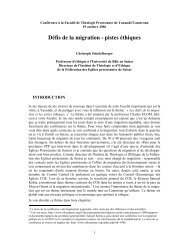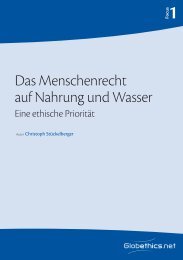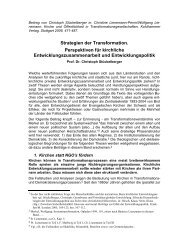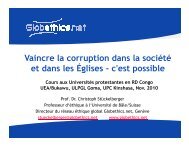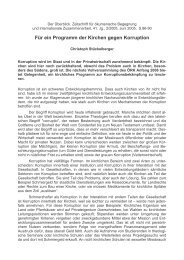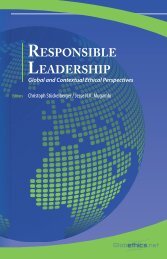BREAK THE CHAINS OF OPPRESION AND THE YOKE OF ...
BREAK THE CHAINS OF OPPRESION AND THE YOKE OF ...
BREAK THE CHAINS OF OPPRESION AND THE YOKE OF ...
Create successful ePaper yourself
Turn your PDF publications into a flip-book with our unique Google optimized e-Paper software.
Ethics instrument, which corresponds to the Polluters-Pay-Principle as well as<br />
the Capability-to-Contribute-Principle. The RCI combines the cumulated<br />
CO emissions of a country and its purchasing power parity and the<br />
2<br />
distribution of wealth. The industrialized countries therefore have the<br />
biggest share to pay, but developing and transition countries with purchasing<br />
power and wealthy elite are called to contribute accordingly. This<br />
country index shows a way of climate burden sharing. It is an ethically serious<br />
effort to make climate justice measurable and politically operational.<br />
7. The combination of positive and negative sanctions. Justice in general as well<br />
as climate justice can be strengthened by positive sanctions (such as incentives,<br />
repayments, awards, facilitated access to services etc.) and negative<br />
sanctions (taxes and other burdens, punitive measures, court). Positive<br />
sanctions are ethically preferable, because they encourage the right behavior.<br />
But negative sanctions to establish punitive justice are often also necessary,<br />
especially to change the behavior of “black sheep” who do not react<br />
on positive sanctions. Both mechanisms presuppose that CO2 emissions<br />
are seen as a severe, unethical misbehavior.<br />
8. Efficiency and Transparency are key factors of good stewardship using limited<br />
resources. The efficient use of resources (energy, capital, organizational<br />
structures, intellectual creativity etc.) allows reducing costs, helping<br />
more people and saving more lives. It is an expression of responsibility and<br />
sustainability for future generations. Transparency supports the efficient<br />
use of limited resources by reducing corruption, abuse and wrong investments.<br />
Transparency and efficiency are important aspects of procedural<br />
justice.<br />
9. Market related instruments. The international free market mechanism contributes<br />
substantially to general economic growth and to global interaction<br />
and peace. Programs like “Financing for Climate - Innovative Solutions<br />
and New Markets” 7 tries to win the private sector to take climate change as<br />
business opportunity. Without private investments, climate-related funding<br />
will never be enough. But market related instruments alone could not<br />
and cannot solve three major problems and made them even more severe:<br />
poverty eradication, fair distribution and climate stabilization. Climate<br />
change today can be seen as the biggest market failure in human history. 8<br />
� � � � �<br />
Can the market then be a chance to solve it? From an ethical point of view,<br />
the answer can be found in the criteria for climate justice: if and where ever<br />
7 Title of a Conference of the State Secretariat for Economic Affairs of the Swiss Government,<br />
the International Finance Corporation IFC and Swiss Re, 11-12 September 2008<br />
in Zurich.<br />
8 This is the view of the Stern Report: Stern Review on the Economics of Climate Change,<br />
HM Treasury, UK 2006. www.hm-treasury.gov.uk/independent_reviews.<br />
������������������������������������������������<br />
� � � � ����������������������� �<br />
88<br />
– CLIMATE JUSTICE <strong>AND</strong> TAX JUSTICE –



